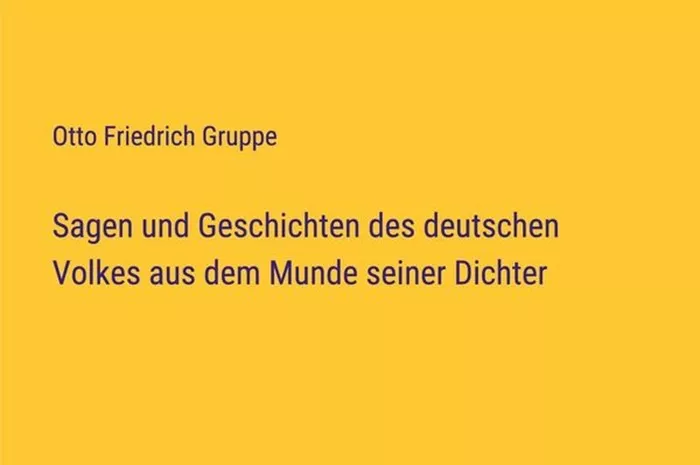The 19th century was a transformative period for German poetry. With the fading echoes of Romanticism and the emergence of Realism, poets sought new ways to express human emotion, national identity, and intellectual thought. Among them was Otto Friedrich Gruppe (1804–1876), a German poet, philosopher, and philologist whose works contributed significantly to literary and philosophical discourse. Though not as widely recognized as contemporaries such as Heinrich Heine or Eduard Mörike, Gruppe played an essential role in the evolution of 19th-century German poetry. This article explores his life, literary contributions, and influence, while comparing his work to that of other German poets of the era.
Otto Friedrich Gruppe
Born in 1804 in Danzig (now Gdańsk, Poland), Otto Friedrich Gruppe was not only a poet but also a scholar deeply invested in classical philology and aesthetics. His academic inclinations shaped his literary works, infusing them with intellectual rigor. Unlike some of his contemporaries who focused primarily on emotional expression, Gruppe sought a balance between artistic beauty and rational thought. He was a prolific writer, contributing essays and poetry that reflected both his philosophical insights and his commitment to artistic refinement.
His career was marked by extensive engagement with classical literature. As a philologist, Gruppe examined ancient Greek and Roman texts, and these influences are evident in his poetry. His approach to poetry was deeply informed by his scholarly background, making him a unique figure among 19th-century German poets.
Gruppe’s Contribution to 19th Century German Poetry
German poetry in the 19th century was characterized by a tension between Romantic idealism and the emerging Realist movement. Gruppe’s poetry occupies a distinctive place within this literary landscape. While he retained some Romantic elements, particularly in his focus on beauty and nature, he also embraced a more structured, intellectual approach that aligned with classical traditions.
His works often explored themes of aesthetics, philosophy, and mythology. Unlike Heinrich Heine, who employed wit and satire to critique German society and politics, Gruppe maintained a more academic tone. His poetry was reflective rather than revolutionary, offering meditations on history, art, and the human condition. In this regard, he shared similarities with poets like Friedrich Rückert, who also integrated scholarly knowledge into their poetic compositions.
A Comparison with Contemporary Poets
To better understand Gruppe’s place in German poetry, it is essential to compare his work with that of other notable 19th-century German poets.
Heinrich Heine (1797–1856)
Heinrich Heine was one of the most influential German poets of the 19th century, known for his sharp wit, political engagement, and lyrical mastery. Unlike Gruppe, who maintained a more detached and scholarly approach, Heine actively critiqued the socio-political landscape of his time. Heine’s poetry, such as in Buch der Lieder, combines Romantic lyricism with irony, making his work highly accessible and emotionally powerful. While Gruppe’s poetry was more intellectual, Heine’s had a broader popular appeal.
Eduard Mörike (1804–1875)
Eduard Mörike, another contemporary of Gruppe, was known for his delicate and lyrical style. His poetry often reflected personal emotions and natural beauty, as seen in works like Mozart auf der Reise nach Prag. In contrast, Gruppe’s poetry was more philosophical and structured. While Mörike captured fleeting moments of beauty and emotion, Gruppe focused on broader intellectual themes.
Friedrich Rückert (1788–1866)
Friedrich Rückert, like Gruppe, had a deep interest in classical and Oriental literature. Rückert’s poetry, especially his translations of Eastern poetry, demonstrated his linguistic skill and scholarly depth. Gruppe, too, incorporated classical influences but remained more rooted in Western philosophical traditions. Both poets exemplified a learned approach to poetry, yet Rückert’s work had a stronger lyrical and musical quality compared to Gruppe’s more structured and analytical compositions.
The Influence of Classical Traditions in Gruppe’s Work
A defining characteristic of Otto Friedrich Gruppe’s poetry is his reliance on classical traditions. His philological background allowed him to draw upon ancient Greek and Roman literature, making his poetry distinct from that of many of his contemporaries. This classical influence is evident in his themes, which often explore mythology, aesthetics, and the philosophical underpinnings of art.
While Romantic poets like Novalis sought transcendence through mystical and emotional experiences, Gruppe approached beauty and poetry from a rational perspective. He analyzed the principles of poetic form and artistic expression, bridging the gap between the past and the present. His work can be seen as an intellectual continuation of German poetry rather than a radical departure from tradition.
The Legacy of Otto Friedrich Gruppe
Though Otto Friedrich Gruppe is not as widely recognized today as some of his contemporaries, his contributions to 19th-century German poetry remain significant. His fusion of classical scholarship with poetic expression set him apart in an era dominated by Romanticism and Realism. His works reflect a commitment to intellectual depth and artistic beauty, qualities that continue to resonate in literary discussions.
His influence extends beyond poetry into the fields of aesthetics and philosophy. As a scholar, his contributions to philology and literary criticism helped shape the academic study of poetry. His balanced approach to poetry—combining emotion with reason, beauty with structure—demonstrates the intellectual richness of 19th-century German poetry.
Conclusion
Otto Friedrich Gruppe occupies a unique place in the history of German poetry. As a 19th-century German poet, he blended classical traditions with the evolving literary currents of his time. While poets like Heine and Mörike captured emotion and personal experience, Gruppe provided a more structured and scholarly perspective. His contributions, though sometimes overshadowed by more famous poets, highlight the diverse intellectual landscape of 19th-century German poetry.
Through his poetic and academic endeavors, Gruppe enriched the literary tradition of his era, demonstrating that poetry can be both an art and an intellectual pursuit. As scholars and readers continue to explore the complexities of 19th-century German poetry, Otto Friedrich Gruppe’s work deserves a place among the notable poets who shaped the literary history of Germany.

